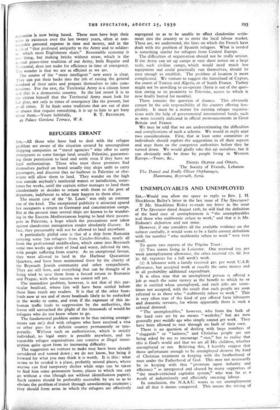REFUGEES ERRANT
Sta,—All those who have had to deal with the refugee problem are aware of the situation created by unscrupulous shipping companies or " travel agencies " who offer to carry immigrants to some foreign land, usually Palestine, guarantee- ing them permission to land and settle even if they have no legal authorisatiqn. Those who trust those promises find themselves packed on board usually tiny ships unfit to carry passengers, and discover that no harbour in Palestine or else- where will allow them to land. They wander on the high seas outside anybody's territorial waters or jurisdiction, some- times for weeks, until the captain either manages to land them clandestinely or decides to return with them to the port of departure, indifferent to what may happen to them after.
The recent case of the ' St. Louis' was only an extreme one of the kind. The exceptional publicity it attracted .spared her occupants a return to Germany and concentration camps. But at the present time several ships are known to be wander- ing in the Eastern Mediterranean hoping to land their passen- gers in Palestine, a hope which the precautions now taken against clandestine immigration render absolutely illusory. In fact, they presumably will not be allowed to land anywhere.
A particularly pitiful case is that of a ship from Rumania carrying some 70o refugees from Czecho-Slovakia, nearly all from the professional middle-class, which came into Beyrouth some two weeks ago short of food and water, infested by rats, with people suffering from scurvy. As an exceptional favour, they were allowed to land in the Harbour Quarantine Quarters, and have been maintained there by the charity of the Beyrouth Jewish community and other sympathisers. They are still here, and everything that can be thought of is being tried to save them from• a forced return to Rumania and Prague, with what success we cannot tell yet.
The immediate problem, however, is not that of this par- ticular boatload, whose fate will have been settled before these lines reach any readers. It is that of the other boat- loads now at sea and of more boatloads likely to be embarked in the weeks to come, and even if the exposure of this in- human traffic leads to suppression by the authorities, this leaves still untouched the plight of the thousands of would-be refugees who do not know where to go.
The fundamental problem seems to be that existing arrange- ments can on:y deal with refugees who have received a visa or other pass for a definite country permanently or tem- porarily. Without such an authorisation, which is strictly individual, no legal entry is possible anywhere, and no reputable refugee organisations can connive at illegal immi- gration quite apart from its increasing difficulty.
The suggestion we venture to make may have been already considered and turned down ; we do not know, but bring it forward for what you may think it is worth. It is this: what seems to be needed is a place, probably several places, where anyone can find temporary shelter while steps can be taken to find him some permanent home, places to which one can go without a visa (though not without identification papers). Such centres should be preferably accessible by sea so as to obviate the problem of transit through unwelcoming countries ; they should form areas in which the refugees are effectively segregated so as to be unable to effect clandestine settle- ment into the country or to enter the local labour market. These are, we understand, the lines on which the French have dealt with the problem of Spanish refugees. What is needed is something similar for refugees from Central Europe.
The difficulties of organisation should not be really serious. If the Army can set up camps at very short notice on a large scale, such civilian camps, which would need much less equipment and could practically run themselves, should be easy enough to establish. The problem of location is more complicated. We venture to suggest the hinterland of Cyprus, the coasts of Tunisia and Algeria, or of South France. Turkey might not be unwilling to co-operate (Syria is out of the ques- tion owing to its proximity to Palestine, access to which is now finally barred for months).
There remains the question of finance. This obviously cannot be the sole responsibility of the country offering hos- pitality. It must be a matter for existing refugee organisa- tions with the help of governmental international funds, such as were recently indicated in official pronouncements in Great Britain and France.
We may be told that we are underestimating the difficulties and complications of such a scheme. We would in reply urge two considerations. First, that at least some committee or individuals should explore the suggestions in all their aspects and urge them on the competent authorities before they be turned down. We would gladly take this up ourselves, but it can obviously only be done by people living in Western Europe.—Yours, &c.,
DANIEL OLIVER and Others,
The Society of Friends, Lebanon The Daniel and Emily Oliver Orphanages, Hammana, Beyrouth, Syria.








































 Previous page
Previous page